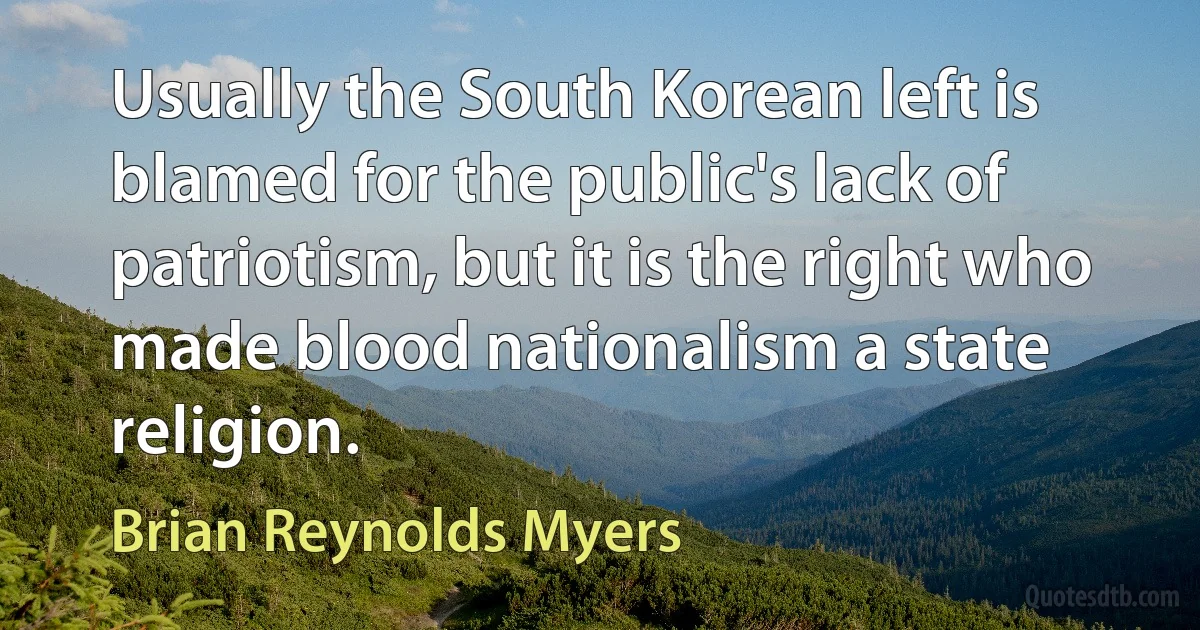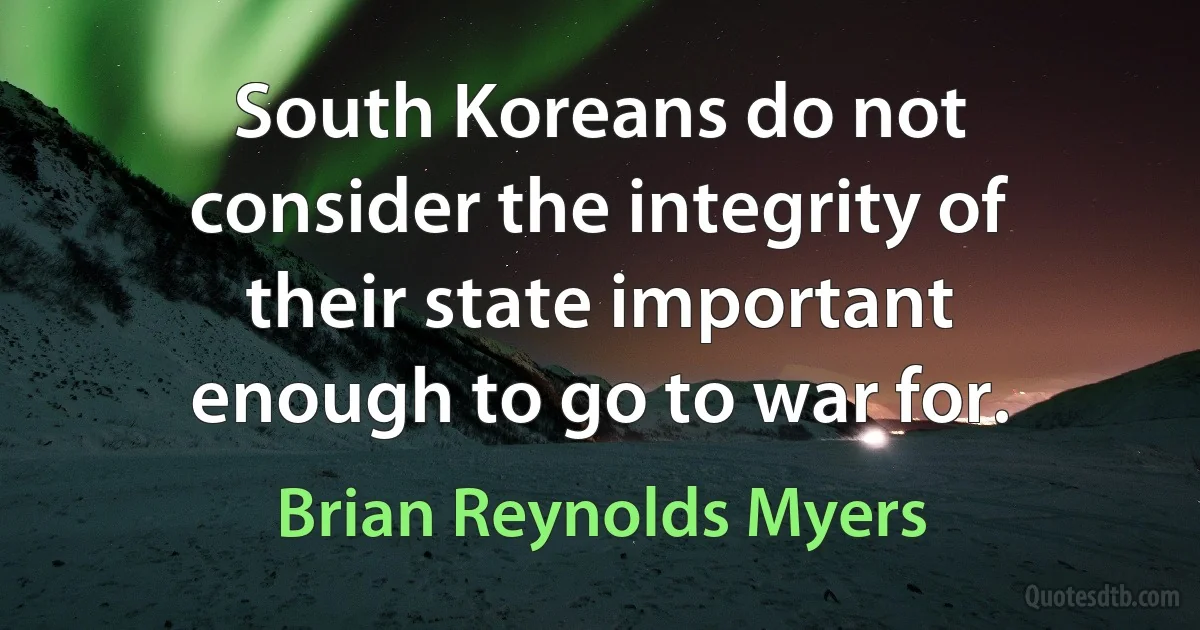Brian Reynolds Myers quotes - page 4
"What belongs together, is growing together again," Willy Brandt said in 1989. The formulation implies a more balanced and grass-rootsy process than actually ensued in Germany - or is likely to take place here. Koreans belong together and will someday grow back together. But if the South doesn't take the upper hand in training and guiding that growth, the North will.

Brian Reynolds Myers
[T]he 1919 uprising is memorialized in the North without a public holiday as an example of how badly things go when a nation lacks a parental leader. This doesn't stop propaganda from claiming the protests originated under the influence of Kim Hyŏng-jik, the father of Kim Il Sung, who himself impressed everyone at the age of six by ... but never mind. The Blue House is unlikely to quibble with this version of history on the day itself. With these meshing tendencies and measures the ruling camp evidently hopes to bond with the Kim regime over a shared anti-Japanese tradition, to present today's ROK and DPRK as branches of the same Shanghai tree, put nationalism above liberal-democratic principles, and minimize opposition to all these things. No less obvious is the larger goal.

Brian Reynolds Myers
[I]n a confederation the South must accept the ultra-nationalist Kim Il Sung cult, whereas the North must acknowledge only the South's superior prosperity and technology - and one of the main goals of confederation is to eliminate that gap as rapidly as possible. (It will be as much a matter of pulling the South down as the North up.)

Brian Reynolds Myers
Western observers focus more on the regime's economic failures than the North Koreans themselves do. Remember that it was only in recent modern times that Western societies began expecting the state to secure constant economic growth and rising prosperity. Well into the 20th century people expected little more from the state than that it protect them from foreign powers, and expand the influence or territory of the nation. Prussia was remarkably like North Korea in many ways, yet we remember it as a very successful state. If we judge North Korea by its own standards - instead of by the communist standards we hope its people judge it by - we must admit it has performed very well.

Brian Reynolds Myers
[T]he peninsula flag means two very different things to the two Koreas. In the South it symbolizes a desire for peaceful co-existence, or at most for a unification of equal partners in the reassuringly remote future. In wall posters above the DMZ it has always symbolized the southern masses' yearning for "autonomous unification", meaning absorption by the North. It's worrying to think how inner-track propaganda is certain to misrepresent the South Koreans' eschewal of their state flag for this of all symbols - and at this of all events.

Brian Reynolds Myers
[T]he new line that the Taehan minguk was not founded in August 1948, but instead came into existence when a provisional government was formed in Shanghai in 1919. I don't need to remind anyone of the internationally accepted criteria for statehood. The Blue House seems more interested in downgrading the republic that fought the North than in making a serious case for the statehood of something else. The original modest budget for the 70th anniversary of the ROK's founding has already been cut. The joint North-South commemoration of the March 1st uprising's 100th anniversary next year is likely to make the festivities this August 15 look subdued in comparison.

Brian Reynolds Myers
Foreigners assume that because of the war, the two sides must dislike each other more than West and East Germans did. The opposite is the case. Some of my students say, "The North would never attack us, we're the same people,” as if the war never happened. And North Korea would now be just as committed to unification if it hadn't.

Brian Reynolds Myers
Let's remember not only how many South Koreans were killed, injured or abducted during a war the North started, but also that one of the most shocking parts of that conflict for people who experienced KPA occupation was seeing neighbors emerge on day one as fully-formed, snitching supporters of the enemy. Many bore titles in the underground organizations to which, it turned out, they had belonged for years. In several recorded cases they denounced people who were shot on the spot. That trauma sits deep.

Brian Reynolds Myers
We Anglophones tend to use the words nation and state more or less interchangeably, but when one nation is divided into two states, it's important to stick to the Koreans' own practice of distinguishing clearly between nationalism (minjokjuŭi) and patriotism / state spirit (aeguksim, kukka chŏngsin, kukkajuŭi, etc). Historians do this even in English when discussing the Weimar Republic, where nationalism undermined support for the state - and for liberal democracy - just as it does in South Korea today.

Brian Reynolds Myers
Ideology, legitimacy, authority: Such topics used to interest academics no end. The mania for quantifying the social sciences and the attendant decline in foreign-language acquisition have changed things. I remember Sovietologists lamenting this trend when I was at school in the 1980s. It's gone much, much further since. What cannot be researched with the proper statistical-numerical methodology is thought beneath serious analysis. On the rare occasions when a non-quantifier takes the microphone at a conference, the Gradgrinds lean back with an indulgent smile: Time for some light relief.

Brian Reynolds Myers
Brian Reynolds Myers
Occupation: American AuthorBorn: 1963
Quotes count: 148
Wikipedia: Brian Reynolds Myers
![In Germany, it's, let's say it's 5:59 and you're heading for the bakery or whatever and it's due to close at 6. The German will walk right up to that door and close it right in your face, they will lock it on the other side of that glass door with a shrug, like "sorry". A [South] Korean would never do that, ever. And, and this is what I like about them. (Brian Reynolds Myers)](https://cdn.quotesdtb.com/img/quotes_images_webp/26/brian-reynolds-myers-bakery-534326.webp)








